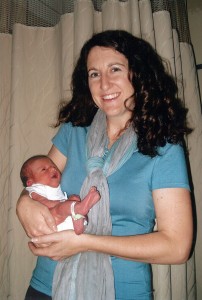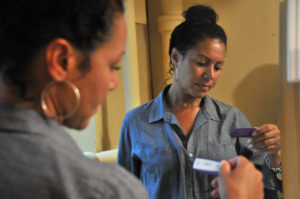By Lindsay Steele
For those of you who saw my picture in last month’s Messenger and noticed I’m a little rounder than usual — yes, I’m expecting!
It seems like a miracle, and I find myself in disbelief constantly. It seems like it’s taken a long time to get to this point.

Baby boy Steele is about 20 weeks gestation in this ultrasound image.
I’d always suspected pregnancy might be difficult for me to achieve, and doctors confirmed my fears in the summer of 2014. As a Polycystic Ovary Syndrome (PCOS) sufferer, my hormone levels were off just enough to prevent ovulation each month. Without ovulation, pregnancy cannot occur.
I wasn’t sure what to think at the time of diagnosis. I thought I was fine with the possibility of not being able to have biological children, but over time it became increasingly difficult to look at burgeoning baby bumps and wonder, “Why them and not me?”
My husband and I did have hope in the form of oral ovulation-regulating medications. Still, I struggled a bit emotionally and spiritually with the idea of treatment. The treatment is church-approved and allows for natural conception, but I wondered: was my infertility diagnosis a sign from God that I wasn’t supposed to have biological children? Was I supposed to adopt instead? Was I playing God if I went forward with treatments?
A fellow St. Mary’s-Davenport parishioner helped ease my fears. She explained that, even with the medication, it would still be up to God to determine if we achieved pregnancy. I realized she was right – ovulation-regulating medications are not a guarantee. Statistics from the American Society of Reproductive Medicine show that women on these medications for up to six months have a 20-30 percent chance of getting pregnant and carrying a baby to term. The odds are about half of what they would be for a healthy couple trying to conceive within the same time frame.
Last summer, my husband and I decided we were ready to try the treatment. Though I sadly admit that I don’t pray as often as I should most of the time, I found myself fervently praying for God’s will and the ability to accept the outcome. My grandmother and her prayer group, in turn prayed for St. Gerard’s intercession.
The first month was unsuccessful. I didn’t have high hopes for the second month either, but I suspected something might be up when I began to feel abdominal discomfort coupled with an uncharacteristic craving for spicy food.
The “Am I? Am I not?” dialogue played over and over again in my head. After a few days of ruminating, I finally got up the courage to take a test. Almost immediately, the telltale second line showed up. I didn’t cry or scream: I just looked at the test, stunned.
To our great relief and joy, all of the ultrasounds and heartbeat checks so far have indicated that our little one is healthy and growing well. Last month, we found out it’s a boy. I’ve begun to feel him move around, and I love to rub my stomach in response, even though I’m sure he can’t feel it yet. We are so excited to meet our little guy and shower him with love.
As I near the third trimester, I find myself wondering why God allowed me to get pregnant. So many of my acquaintances with infertility are still waiting and my initial question has been reversed: “Why me and not them?” I don’t think I’ll ever fully understand.
Regardless, I thank God for the gift of life growing inside me and ask for your prayers – both for the health of our little one and for all couples struggling with infertility.
(Editor’s note: Lindsay Steele is a reporter for The Catholic Messenger. Contact her at steele@davenportdiocese.org or by phone at (563) 888-4248.)









